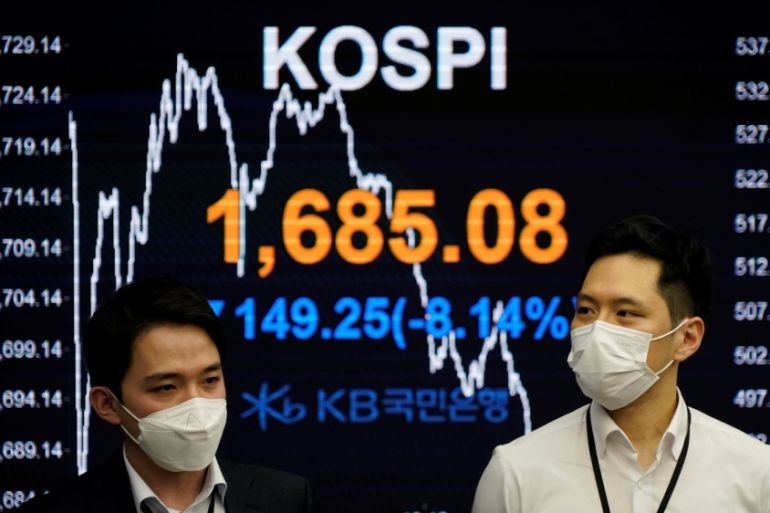Wild ride: Markets recoup some losses after virus-driven rout
In Asia, stocks hit lower limits but recover quickly as authorities announce measures to ease the virus’s effects.

Asian financial markets slumped on Friday after Wall Street posted its worst single-day crash since 1987, but quickly recouped losses as policymakers ramped up efforts to fight the coronavirus outbreak and its economic effects.
Despite those measures and the partial rebound, most Asian shares remained a sea of red in late trading.
Keep reading
list of 3 itemsDow falls 2,300 points – worst one-day loss since 1987 crash
Oil falls 8% as price war heats up, Trump bans travel from Europe
“Right now, there’s nowhere to hide,” Alexander Chia, head of regional equity research at RHB Investment Bank told Al Jazeera. “Even companies seen as beneficiaries of the virus outbreak are down. The entire market is derisking.”
Japan’s Nikkei 225 index plunged close to 10 percent in early trade before the Bank of Japan announced an unscheduled 200 billion yen ($1.9bn) plan to buy government bonds with five to 10-year maturities. The Nikkei recovered losses to trade 5.4 percent lower afterwards.
In South Korea, the benchmark Kospi sank more than 7 percent to trigger a trading halt in the morning, later recovering to 5.2 percent down from the previous close.
In China, where the number of new cases reported daily has shrunk to single digits, losses in financial markets were less severe. The benchmark Shanghai Composite index lost 4.1 percent on its opening although it later recovered to trade almost flat at 0.72 percent down.
Hong Kong’s Hang Seng Index, which fell more than 7 percent in early trade, later regained its footing to trade 5.8 percent down from its most recent close.
Some of the day’s wildest swings were in Australia, where shares were down as much as 8 percent in the morning. However, the S&P/ASX 200 ended 0.5 percent higher after the country’s central bank injected 8.8 billion Australian dollars ($5.5bn) into money markets, more than double the amount it earlier said it would offer.
Meanwhile, India’s NSE Nifty 50 climbed 1.1 percent after declining 10 percent to hit its lower limit hours earlier.
Most major Asian stock indices have fallen more than 20 percent from their recent highs, entering what traders define as bear markets.
Currencies which were hit hard in early trading also recovered. The euro gained 0.3 percent to trade at $1.1214 while the offshore yuan climbed 0.3 percent to 7.0066 against the US dollar.
Gold lost 4 percent early on Friday to trade at $1,563.42 an ounce, but later gained 0.1 percent to $1,577 per ounce.
Bond yields in the Asia Pacific remained elevated throughout the day. Yields for sovereign 10-year notes in Australia, New Zealand, Thailand, Korea and Singapore, which typically rise when prices fall, were up on Friday, indicating that some investors felt confident enough to leave the relative safety of bonds.
‘Live to fight another day’
But investors were still scrambling to conserve cash instead of pouring money into stocks, said RHB’s Chia. The price-earnings ratio, which investors typically rely on to gauge the fundamental value of a stock, was meaningless because analysts could no longer determine the impact of the virus on company earnings, he noted.
“Nobody knows the extent to which the pandemic is affecting the global economy,” Chia said, adding that there was scepticism among investors over how seriously politicians were treating the pandemic.
“There are two things on investors’ minds right now: one, preserving capital and (two) trying to live to fight another day,” he said.
US President Donald Trump tried to calm investors on Wednesday after his announcement of a 30-day travel suspension from Europe to the US crashed markets, saying: “This is not a financial crisis.”
But investors continued to sell off shares as the number of deaths and infections caused by the coronavirus rose, with the majority of new cases occurring outside China where the outbreak originated. The World Health Organization declared the virus a “pandemic” on Wednesday and the death toll has since climbed past 4,700 people with more than 128,000 infected globally.
“I don’t think we’ve reached the bottom [of the markets] yet,” said Suvro Sarkar, equities analyst at DBS Bank in Singapore, noting that the number of infections, especially in Europe, were still on the rise.
“I think we will see downward pressure for the next one to two weeks,” he told Al Jazeera.
Other investors, however, see the current market selldown as a buying opportunity.
“Pandemics come and go,” Danny Wong, CEO of Kuala Lumpur-based fund Areca Capital, told Al Jazeera.
Wong said he was focused on collecting stocks of companies with strong fundamentals, although he was in no rush to do so.
“Markets will recover, but the timing (of that recovery) is beyond my guess,” he said.